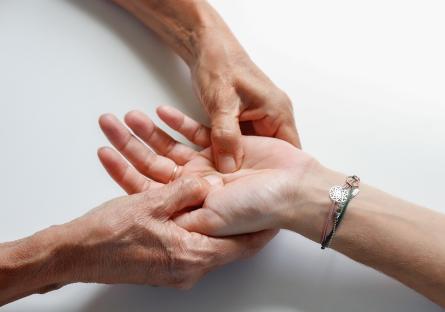This article appears for archival purposes. Any events, programs and/or initiatives mentioned may no longer be applicable.

Do you feel like you’ve got more knots in your back than the rigging on a sailboat? Is mental stress starting to put tension on your body? A massage therapy session could help bring you the ease and relaxation you need to recenter yourself. A good massage can be restorative and a boon for your mind and body.
Types of Massages
There are several different varieties of massage therapy. A few factors can help narrow down which is right for you: how much tension are you experiencing? Are you experiencing bodily pain that could benefit from a targeted, therapeutic massage or are you looking for something more gentle and relaxing? Your sensitivity and pre-existing conditions can be a factor when deciding on what kind of massage would work best for you.
Types of massage therapy include:
- Swedish: A gentle full body massage that is good for undoing “knots” in the body and alleviating muscle tension. It’s a good choice if you're new to massages and are worried about too much pressure.
- Deep Tissue: This form of massage applies more pressure to the body, making it ideal for treating sore muscles and chronic muscle pain.
- Hot Stone: A relaxing massage that uses heated stones to improve blood flow and alleviate muscle tension.
- Aromatherapy: This form of massage combines gentle pressure with the use of diluted essential oils. It’s a good choice for those who enjoy fragrant scents.
- Trigger Point: Best suited for people who already have injuries or chronic pain. This therapy targets "trigger points" - areas of pain-inducing tightness in your muscle tissue - to relieve pain and tension in these areas. Trigger point massage is particularly good at alleviating chronic head and neck muscle pain.
- Shiatsu: A whole-body massage that is effective for treating lower back pain and reducing muscle tension.
- Reflexology: Gentle to firm pressure on the hands, feets, and ears. It’s very beneficial for reducing pain and anxiety.
- Myofascial Release: This therapy works on the connective tissue of your muscles, reducing pressure and tension in these areas. It’s good for treating headaches and myofascial pain syndrome.
The Physical & Mental Benefits of Massage
The physical benefits of a 30- to 60-minute-long therapeutic massage session is significant. Massage can provide the following tangible benefits:
- Improved circulation
- Reduction in muscle stiffness and soreness
- Lowers blood pressure and heart rate
- Decreased joint inflammation
- Better quality of sleep
- Quicker recovery between workouts
- Improved flexibility
- Reduced pain
- Enhanced immune response
- Reduces injury risk
- Increases energy
The benefits of massage aren’t all physical. It can do wonders for your state of mind:
- Alleviates stress
- Reduces anxiety
- Improves overall mood
- Fosters feelings of calmness and relaxation
Oxytocin
Another benefit of massage is that it can boost your oxytocin levels. Sustained physical contact can stimulate the production of oxytocin, the "love hormone" that produces feelings of relaxation, trust, and bonding. If you’ve ever wondered why dogs like being petted so much, it’s because they experience this same phenomenon.
What to Know Before Getting a Massage
Like any kind of exercise or therapy, it helps to prepare yourself and set expectations before getting a massage. Here’s a few things to keep in mind:
- Hydrate! Make sure you drink plenty of water before you go to your session. You do not want to be dehydrated while getting a massage - that dehydration can make your muscles stiffer and more unresponsive.
- Make sure you shower and take care of your bathroom business before you go. You don’t want to have to get up in the middle of a massage to use the restroom.
- Your massage therapist will consult with you beforehand about your physical condition. Let them know about any problem areas you want them to focus on or to avoid entirely. Don’t be afraid to communicate with them before, during, and after the massage.
- Some types of massage require some degree of undressing. Communicate your comfort level about this ahead of time. Only remove the clothing you feel comfortable removing. If you feel uncomfortable disrobing, keep in mind that there are forms of massage therapy like chair massages, hand massages, and reflexology that can be done fully clothed.
- If you feel pain or discomfort during the massage, don’t keep it to yourself. Your massage therapist may not realize they’ve hit a tender area. If the pressure is too intense, you can ask them to ease up a bit. The same applies to the reverse - if you feel like you’d benefit from a bit more intensity, ask.
Article by Austin Brietta
Want more wellness tips? Check out these stories: